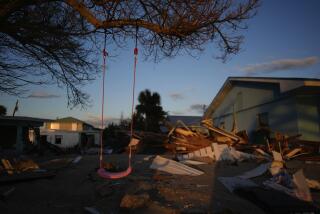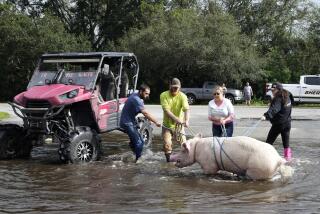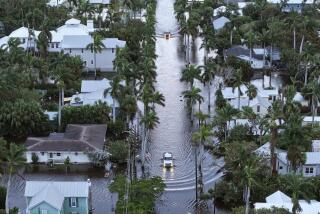Plaquemines Parish remains flooded by Isaac; levee to be breached
As Hurricane Isaac weakened to a tropical storm but continued to unleash heavy rain, winds and a dangerous storm surge along the northern Gulf Coast, authorities said they would breach a levee in flooded Plaquemines Parish to try to relieve pressure.
But weather conditions were too severe to try it Wednesday, Coastal Protection and Restoration Authority head Garret Graves told the Associated Press. It was unclear how quickly authorities could get needed equipment to the site, south of New Orleans.
Isaac came ashore Tuesday night with 80-mph winds and driving rain in the parish, where levees have yet to be reinforced after 2005’s catastrophic Hurricane Katrina. In New Orleans, where the flood-control system has mostly been upgraded, levees were holding.
PHOTOS: Isaac lashes Gulf Coast
In Plaquemines, at least 118 people were rescued, including 25 trapped on their roofs or in their attics as water rose 14 feet, Reuters reported. Animals were rescued too, including about 15 dogs, a cat in a cage, even a fawn.
The “Cajun Navy” -- private citizens with boats -- led the rescue effort, Plaquemines Parish President Billy Nungesser told CNN.
“We didn’t think it was going to be like that,” electrician Joshua Brockhaus told the Associated Press after rescuing flood-stranded neighbors in his boat. “The storm stayed over the top of us. For Katrina, we got 8 inches of water. Now we have 13 feet.”
About 2,000 residents had been ordered to evacuate, but only about half were known to have done so before the storm landed, Nungesser said.
St. Bernard Parish Sheriff James Pohlmann said his office had been helping with rescues, evacuations and hurricane response in Plaquemines since 3 a.m. Wednesday.
“What we were hoping for is come nightfall, maybe the effects of the hurricane will decrease and we can get out and start cleaning up,” he said.
The National Guard was also pitching in.
Nungesser, who lost part of the roof on his home, described the wind-driven rain as “like standing in a light socket with a fire hose turned on,” the Associated Press reported.
A bit north in New Orleans, even though the flood-control system was working, Mayor Mitch Landrieu cautioned residents, “Now is not the time to let your guard down.”
“Stay hunkered down,” he said. He imposed a dusk-to-dawn curfew and warned that looting would not be tolerated.
Landrieu also asked residents to flush their toilets as little as possible to reduce stress on the sewer system.
Congress authorized $14.6 billion in flood-control improvements after Katrina, but only about $11 billion worth has been completed.
More than 662,000 customers remained without power, including 60% of New Orleans, authorities said. Most of the outages were in Louisiana, but thousands in Mississippi were also affected.
“Continued high winds, floodwaters and other hazards are preventing our restoration workers from restoring electrical service,” Entergy said on its website.
Louis Armstrong New Orleans International Airport had no power. The airport has been closed since Tuesday and all commercial flights for Thursday have been canceled, the airport said.
As of 7 p.m., Isaac was about 60 miles west of New Orleans and moving about 5 mph, packing 60-mph winds, the National Hurricane Center said.
“The center of Isaac will move farther inland over Louisiana” on Wednesday night and Thursday, and over southern Arkansas by early Friday, the hurricane center said, warning of dangerous storm surges.
Isaac remains about 350 miles wide. Tropical-storm-force winds extend outward up to 175 miles, the center said. The slow-moving storm was still dumping heavy rains and producing a significant storm surge, it said.
Accuweather reported storm surges up to 11 feet at Shell Beach, La., and widespread heavy rain, including more than 9 inches in New Orleans and nearly 16 inches in Royal Palm Beach, Fla.
As Isaac moves inland during the next few days, Accuweather said, damaging gusts could reach Branson, Mo.
President Obama and members of his administration spoke to Gulf Coast officials by phone Wednesday to offer support. The White House said the president also directed the Federal Emergency Management Agency to “remain proactive”’ and prepare for any problems as the storm heads inland.
Elsewhere, large swaths of southern Mississippi were flooded.
“The storm has decided to sit, pretty much unmoved; it’s just pushing up water to our tributaries and low-lying areas,” said Jackson County spokeswoman Monica Cooper. “We are preparing for a night of continued rain and flooding.”
About half of Harrison County, which includes Biloxi, had flooded by midday Wednesday, said county emergency management spokesman Butch Oberhoff. Mandatory evacuations had been ordered over the weekend, and so far there had been no calls for rescue or reports of flooded homes, he said.
The area was still being inundated with rain and high winds, so officials have not been able to assess damage in the region, he said. There were reports of fallen trees and limbs and some blocked roads, he said.
“This storm has just been so frustrating because it’s been so difficult to predict and it’s moving so slowly that -- while it’s not a Category 3 or 4 -- it’s just kind of sitting on top of us and dropping a tremendous amount of rain on top of the storm surge,” Oberhoff said.
Staff writers Molly Hennessy-Fiske and Paloma Esquivel contributed to this report.
ALSO:
Safest-driving cities: Sioux Falls tops list; D.C. is at bottom
Amish beard-cutting: Shears cut symbol of manhood, expert says
Aurora shooting: What happened to the $5 million donated to victims?
More to Read
Sign up for Essential California
The most important California stories and recommendations in your inbox every morning.
You may occasionally receive promotional content from the Los Angeles Times.











